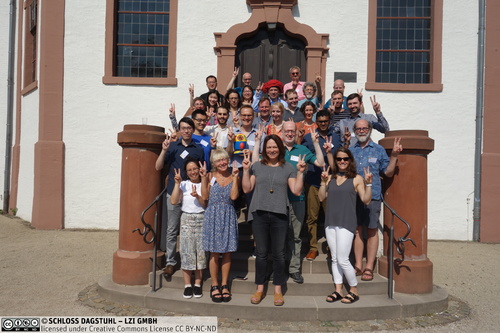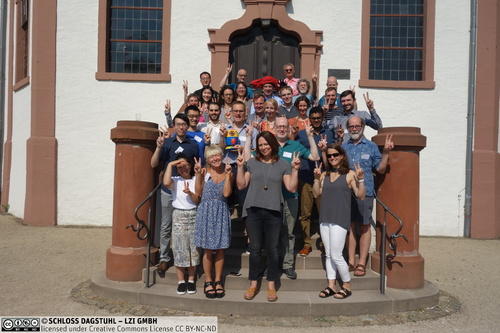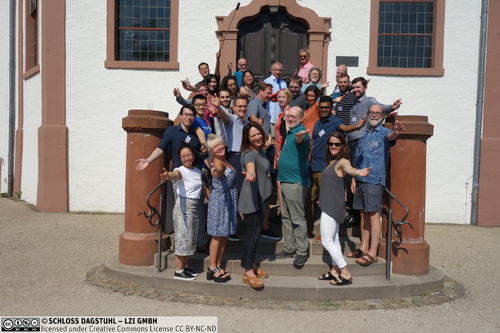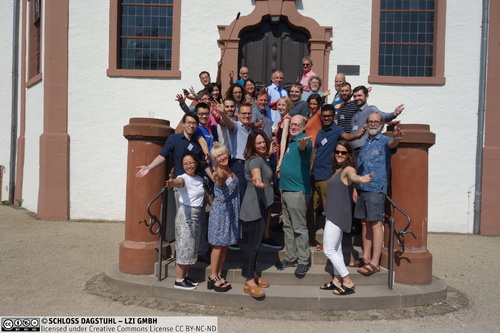Dagstuhl-Seminar 18322
Human-Computer Integration
( 05. Aug – 10. Aug, 2018 )
Permalink
Organisatoren
- Jonathan Grudin (Microsoft Research - Redmond, US)
- Kristina Höök (KTH Royal Institute of Technology - Stockholm, SE)
- Pattie Maes (MIT - Cambridge, US)
- Florian 'Floyd' Mueller (RMIT University - Melbourne, AU)
Kontakt
- Shida Kunz (für wissenschaftliche Fragen)
- Annette Beyer (für administrative Fragen)
Impacts
- Next Steps for Human-Computer Integration : article in CHI '20: Proceedings of the 2020 CHI Conference on Human Factors in Computing Systems, April 2020 - Mueller, Florian 'Floyd'; Strohmeier, Paul; Lopes, Pedro; Seim, Caitlyn; Li, Zhuying; Delfa, Joseph; Nishida, Jun; Gerber, Elisabeth M.; Greuter, Stefan; Wang, Dakuo; Maes, Pattie; Schiphorst, Thecla; Meyer, Jochen; Wolf, Katrin; Reiterer, Harald; Marshall, Joe; Inami, Masahiko; Greenspan, Steven L.; Erickson, Thomas; Kunze, Kai; Grudin, Jonathan; Svanes, Dag; Obrist, Marianna; Nanayakkara, Suranga; Weigel, Martin; Ju, Wendy - New York : ACM, 2020. - Pages 1–15.
- Human–Computer Integration : Towards Integrating the Human Body with the Computational Machine - Mueller, Florian 'Floyd'; Semertzidis, Nathan; Patibanda, Rakesh; Andres, Josh; Strohmeier, Paul; Knibbe, Jarrod; Byrne, Richard; Reiterer, Harald; Grudin, Jonathan; Kunze, Kai; Marshall, Joe; Gerber, Elisabeth M.; Wolf, Katrin; Wang, Dakuo; Maes, Pattie; Obrist, Marianna; Greuter, Stefan; Li, Zhuying; Nanayakkara, Suranga; Weigel, Martin; Andres, Josh; - Boston : Now Publishers, 2022. - 68 S. - (Foundations and trends in human-computer interaction ; 16. 2022, 1). ISBN: 978-1-63828-068-2 / 1-63828-068-1.
The rise of technology that supports a partnership between user and computer highlights an opportunity for a new era of “human-computer integration”, contrasting the previously dominant paradigm of computers functioning as tools. This seminar focuses on embodied integration, where a computer tightly integrates with the person’s body. Although an increasing number of systems are emerging, a thorough understanding of how to design such systems is notably absent. The reason for this is the limited knowledge about how such embodied partnerships unfold, and what underlying theory could guide such developments. This seminar brings together leading experts from industry and academia, including those who are central to the development of products and ideas such as wearables, on-body robotics, and exertion systems. The goal is to address key questions around the design of embodied integration and to jump-start collaborations to pioneer new approaches for a human-computer integration future.
 Jonathan Grudin, Kristina Höök, Pattie Maes, and Florian Mueller
Jonathan Grudin, Kristina Höök, Pattie Maes, and Florian Mueller
The rise of technology that supports a partnership between user and computer highlights an opportunity for a new era of "human-computer integration", contrasting the previously dominant paradigm of computers functioning as tools. However, most work around these technologies only focused on the instrumental perspective to achieve extrinsic performance objectives. However, phenomenology emphasizes that it is also important to support the experiential perspective, which indicates that technology should also help people pay attention to their lived experiences and personal growth in order to deepen their understanding of their own bodies. This seminar focuses on embodied integration, where a computer tightly integrates with the person's body. Although an increasing number of systems are emerging, a thorough understanding of how to design such systems is notably absent. The reason for this is the limited knowledge about how such embodied partnerships unfold, and what underlying theory could guide such developments. This seminar brought together leading experts from industry and academia, including those who are central to the development of products and ideas such as wearables, on-body robotics, and exertion systems. The goal was to address key questions around the design of embodied integration and to jump-start collaborations to pioneer new approaches for a human-computer integrated future.
 Florian Mueller, Jonathan Grudin, Pattie Maes, Zhuying Li
Florian Mueller, Jonathan Grudin, Pattie Maes, Zhuying Li
- Tom Erickson (Minneapolis, US) [dblp]
- Elizabeth Gerber (Northwestern University - Evanston, US) [dblp]
- Steven Greenspan (CA Labs, US) [dblp]
- Stefan Greuter (Deakin University - Melbourne, AU) [dblp]
- Jonathan Grudin (Microsoft Research - Redmond, US) [dblp]
- Ti Hoang (RMIT University - Melbourne, AU) [dblp]
- Masahiko Inami (University of Tokyo, JP) [dblp]
- Wendy Ju (Cornell Tech - New York, US) [dblp]
- Kai Kunze (Keio University - Yokohama, JP) [dblp]
- Joseph La Delfa (RMIT University - Melbourne, AU) [dblp]
- Zhuying Li (RMIT University - Melbourne, AU) [dblp]
- Pedro Lopes (Hasso-Plattner-Institut - Potsdam, DE) [dblp]
- Pattie Maes (MIT - Cambridge, US) [dblp]
- Joe Marshall (University of Nottingham, GB) [dblp]
- Jochen Meyer (OFFIS - Oldenburg, DE) [dblp]
- Florian 'Floyd' Mueller (RMIT University - Melbourne, AU) [dblp]
- Suranga Nanayakkara (University of Auckland, NZ) [dblp]
- Jun Nishida (University of Tsukuba, JP) [dblp]
- Marianna Obrist (University of Sussex - Brighton, GB) [dblp]
- Harald Reiterer (Universität Konstanz, DE) [dblp]
- Thecla Schiphorst (Simon Fraser University - Surrey, CA) [dblp]
- Caitlyn E. Seim (Georgia Institute of Technology - Atlanta, US) [dblp]
- Jürgen Steimle (Universität des Saarlandes, DE) [dblp]
- Paul Strohmeier (University of Copenhagen, DK) [dblp]
- Dag Svanaes (NTNU - Trondheim, NO) [dblp]
- Dakuo Wang (IBM T.J. Watson Research Center - Yorktown Heights, US) [dblp]
- Martin Weigel (Honda Research Europe - Offenbach, DE) [dblp]
- Katrin Wolf (HAW - Hamburg, DE) [dblp]
Verwandte Seminare
- Dagstuhl-Seminar 23212: Designing the Human-Machine Symbiosis (2023-05-21 - 2023-05-26) (Details)
Klassifikation
- artificial intelligence / robotics
- mobile computing
- society / human-computer interaction
Schlagworte
- Embodiment
- mobile computing
- CSCW





 Creative Commons BY 3.0 DE
Creative Commons BY 3.0 DE
